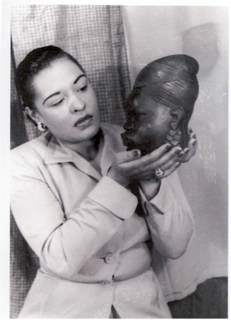
the strange case of Lady Day and the Carved Head
Billie Holiday, Baby Get Lost.
Billie Holiday, You're My Thrill.
Billie Holiday, Ain't Nobody's Business If I Do.
"A man can leave home one morning and come home that night whistling and singing to find there ain't nobody there but him. I left two men like that." Billie Holiday.
It is convenient, maybe too convenient, to segment the career of Billie Holiday based upon her tenure at record companies--so you have the early Columbias (1933-1944), where her voice is as bright and shiny as a new penny; the scant Commodores (1939-1944), the independent label for whom Holiday recorded "Strange Fruit"; and the Verves of the 1950s, where her voice is a ghost and the recordings are cathedrals to its faded beauty.
Often lost in this taxonomy are the records Holiday recorded for Decca from 1944 to 1950. It's hard to call any part of Holiday's career overlooked, but the Deccas don't get that much respect. They aren't really jazz, the common wisdom goes. They're transitional records, with faceless musicians. And true, the Deccas are often overproduced, with Holiday supported by masses of horns, strings, choirs, to the point where it sounds at times as though she has been dubbed over some purple movie score.
Yet, as a listen to the songs above hopefully will prove, the Deccas are still genius. It's still Billie Holiday, at the peak of her voice's power, and given some strong songwriting to contend with. (That wasn't always the case--her early Columbias are remarkable in that never has so much second-rate material been turned into gold through a singer's pure effort.) She's eager for the challenge, diving in and seizing each song for all it's worth. Take "You're My Thrill": listen to the way Holiday sings the word "thrill"--each time taking it slightly differently, sometimes with elation, sometimes just letting the word die out in a whisper.
The Decca era was also one of utter personal hell for Holiday, who, in between recording sessions and dealing with the lousy men in her life, was addicted to heroin, arrested and sentenced for a year to a women's prison in West Virginia, and barred for life from performing in New York nightclubs because she was a felon. In 1949 alone, she was arrested again for narcotics possession but acquitted by a jury. By the end of the decade, the hard living had begun to creep in--you can hear the rasp that would be a prominent part of her '50s vocal style in a few of the late Decca sessions.
Was it surprising that she decided to record "Ain't Nobody's Business If I Do" during this time-- a song that Bessie Smith had immortalized in 1923? The song had taken on enormous resonance to Holiday: "Every man I ever had hated this song and hated to have me sing it...This is more than a song to me, it spells the way of life I tried to live, personal freedom, to hell with the what-will-people-think-people, and all that. I never hurt anybody but myself and that's nobody's business but my own."
"Baby Get Lost" (written by jazz critic Leonard Feather under a pseudonym) and "Ain't Nobody's Business" were recorded on August 17, a session where Holiday was reunited with her old allies from the '30s, Lester Young and Buck Clayton; "Thrill" was recorded on October 19, and features Locust St. fave Bobby Hackett on trumpet. I took all of these tracks off an MCA compilation LP released in the '70s to cash in on the dreadful film Lady Sings the Blues--you can get the complete Deccas here or a good selection here. Here is an incredible Billie Holiday sessionography.
I'm traveling for a bit, (anyone know some good bars in Seattle?) so nothing new until next week. See you soon.
No comments:
Post a Comment